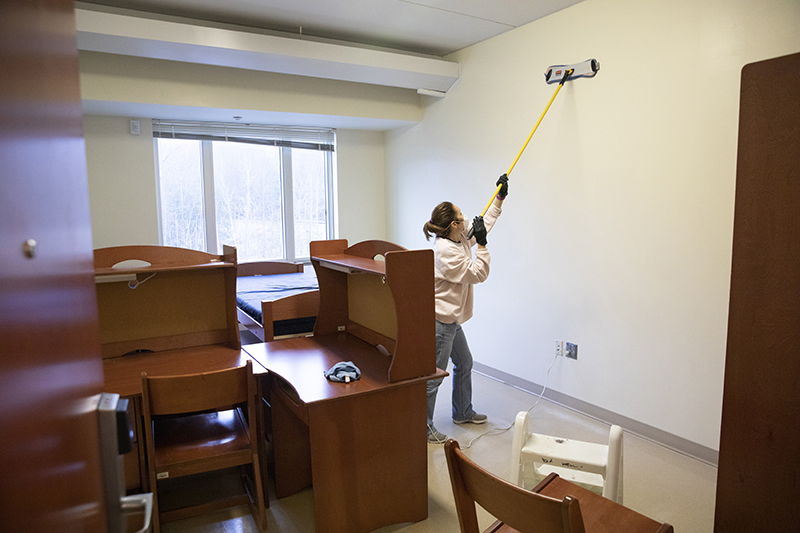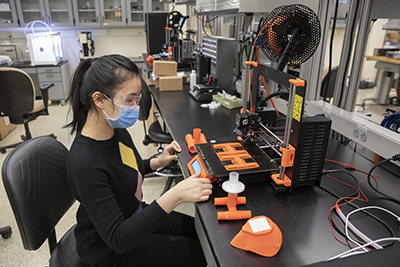Binghamton University transitions to COVID-19 world
Faculty, students adapt to online learning

COVID-19 is nothing less than an extraordinary event that has forced Binghamton University to fundamentally change its operations and educational activities, says Binghamton University President Harvey Stenger. Monitoring of the novel coronavirus began in mid-January, with consultation among campus departments and local public health officials about initial communications and steps to protect the campus.
From there, the global pandemic progressed at lightning speed. On March 11, New York Gov. Andrew Cuomo announced that all SUNY and CUNY campuses would transition to online education, and on March 17, he directed all non-critical employees to begin working from home.
Then, on March 23, the campus learned of the first instance of a member of the Binghamton University community diagnosed with the COVID-19 virus.
The campus remains open, though nearly 7,000 of the students who resided on campus returned to their homes.
“Of our approximately 3,000 staff, about 400 ‘critical’ employees remain on campus to ensure that all vital services continue for the approximately 400 students who don’t have an option to go anywhere else,” Stenger says. “We anticipated this and spent much of early March working to bring staff up to speed on ways to connect to campus from remote locations.”
The students remaining on campus were moved to single rooms with access to a private bathroom in the Dickinson Community.
“This has allowed us to optimize campus services in light of reduced staff, while enabling each student to follow safety guidelines and properly practice social distancing,” Stenger says.
With the transition to online courses, faculty have reimagined instruction and learning, even as students have adapted.
“Some faculty are recording their lectures, and others are holding them live on Zoom,” Stenger says. “Many have found the features in Zoom have benefits not available in a regular lecture class, such as running polls, allowing chat questions to be answered by a TA and even taking attendance.”
And, on March 30, a revised pass/fail grading option for the spring semester was announced, allowing students to take up to 12 credit hours of courses this semester with a pass/fail grade.
“Students will be given the choice to switch from a letter grade to pass/fail after they learn of their final grade,” Stenger adds.
Equally impressive as the transition to online teaching has been the way that faculty, students and staff are pitching in to support their communities.
“With donations from departments across campus, and research underway to help provide healthcare workers with access to enough specialized equipment such as N95 masks, ventilators and face shields, I am extremely proud of our campus,” Stenger says.
Meanwhile, all campus public events are canceled — sporting events, concerts and plays; conferences and lectures; recognition ceremonies; and many, many student organization events — and Commencement has been postponed.
“Commencement is by far my favorite academic ritual at Binghamton, so this decision has been a very difficult one that saddens everyone who was hoping to celebrate the successes of our students,” Stenger says. “Students who are eligible to graduate have been surveyed to help us select a date or dates in the summer and/ or fall when the campus, family and friends will be able to join with them in a special ceremony.”
There is a great deal of uncertainty about the impact the virus will have on state revenues and the budget for SUNY as well.
“This really is uncharted territory for the campus — and for the state and nation — but I think that our faculty, staff and students at Binghamton are very smart and very resilient, and we will find a way to make this work,” Stenger says.
“We have tried to be as transparent as possible about this crisis, with frequent communications to all members of the campus community,” he says. “Since mid-January, we’ve sent more than 20 communications to students, faculty and staff, as well as many to parents and alumni, regarding the changing status of campus activities.”

